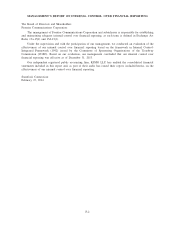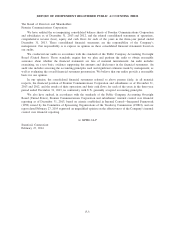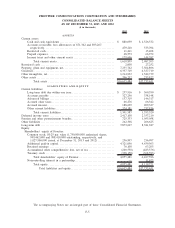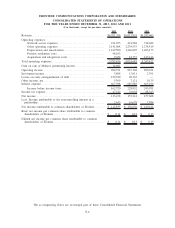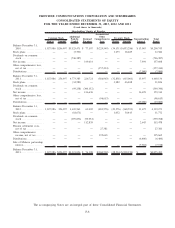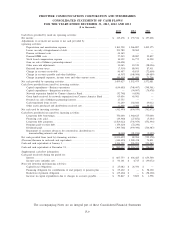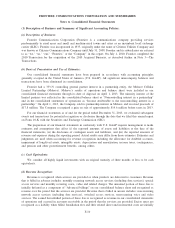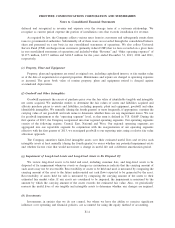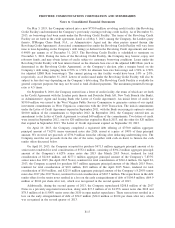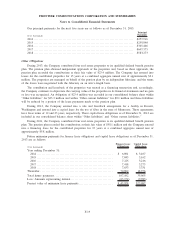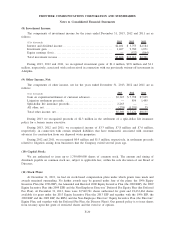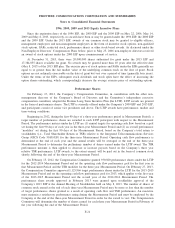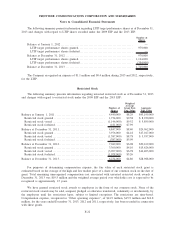Frontier Communications 2013 Annual Report Download - page 74
Download and view the complete annual report
Please find page 74 of the 2013 Frontier Communications annual report below. You can navigate through the pages in the report by either clicking on the pages listed below, or by using the keyword search tool below to find specific information within the annual report.(i) Income Taxes and Deferred Income Taxes:
We file a consolidated federal income tax return. We utilize the asset and liability method of accounting
for income taxes. Under the asset and liability method, deferred income taxes are recorded for the tax effect of
temporary differences between the financial statement basis and the tax basis of assets and liabilities using tax
rates expected to be in effect when the temporary differences are expected to reverse.
(j) Stock Plans:
We have various stock-based compensation plans. Awards under these plans are granted to eligible
officers, management employees, non-management employees and non-employee directors. Awards may be
made in the form of incentive stock options, non-qualified stock options, stock appreciation rights, restricted
stock, restricted stock units or other stock-based awards, including awards with performance, market and time-
vesting conditions. Our general policy is to issue shares from treasury upon the grant of restricted shares,
earning of performance shares and the exercise of options.
The compensation cost recognized is based on awards ultimately expected to vest. U.S. GAAP requires
forfeitures to be estimated and revised, if necessary, in subsequent periods if actual forfeitures differ from those
estimates.
(k) Net Income Per Common Share Attributable to Common Shareholders:
Basic net income per common share is computed using the weighted average number of common shares
outstanding during the period being reported on, excluding unvested restricted stock awards. The impact of
dividends paid on unvested restricted stock awards have been deducted in the determination of basic and
diluted net income per common share attributable to common shareholders of Frontier. Except when the effect
would be antidilutive, diluted net income per common share reflects the dilutive effect of certain common stock
equivalents, as described further in Note 13—Net Income Per Common Share.
(2) Recent Accounting Literature:
Presentation of Comprehensive Income
In February 2013, the Financial Accounting Standards Board (FASB) issued Accounting Standards Update
No. 2013-02 (ASU 2013-02), “Comprehensive Income: Reporting of Amounts Reclassified Out of
Accumulated Other Comprehensive Income,” (Accounting Standards Codification (ASC) Topic 220). ASU
2013-02 requires disclosing the effect of reclassifications out of accumulated other comprehensive income on
the respective line items in the components of net income in circumstances when U.S. GAAP requires the item
to be reclassified in its entirety to net income. This new guidance is to be applied prospectively. The Company
adopted ASU 2013-02 during the fourth quarter of 2012 with no impact on our financial position, results of
operations or cash flows.
Internal Control—Integrated Framework
On May 14, 2013, the Committee of Sponsoring Organizations of the Treadway Commission (COSO)
issued its updated Internal Control—Integrated Framework (the 2013 Framework) and related illustrative
documents. COSO will continue to make available its original Framework during the transition period
extending to December 15, 2014. The Company currently utilizes COSO’s original Framework, which was
published in 1992 and is recognized as the leading guidance for designing, implementing and conducting
internal controls over external financial reporting and assessing its effectiveness. The 2013 Framework is
expected to help organizations design and implement internal control in light of many changes in business and
operating environments since the issuance of the original Framework, broaden the application of internal
control in addressing operations and reporting objectives, and clarify the requirements for determining what
F-12
FRONTIER COMMUNICATIONS CORPORATION AND SUBSIDIARIES
Notes to Consolidated Financial Statements


